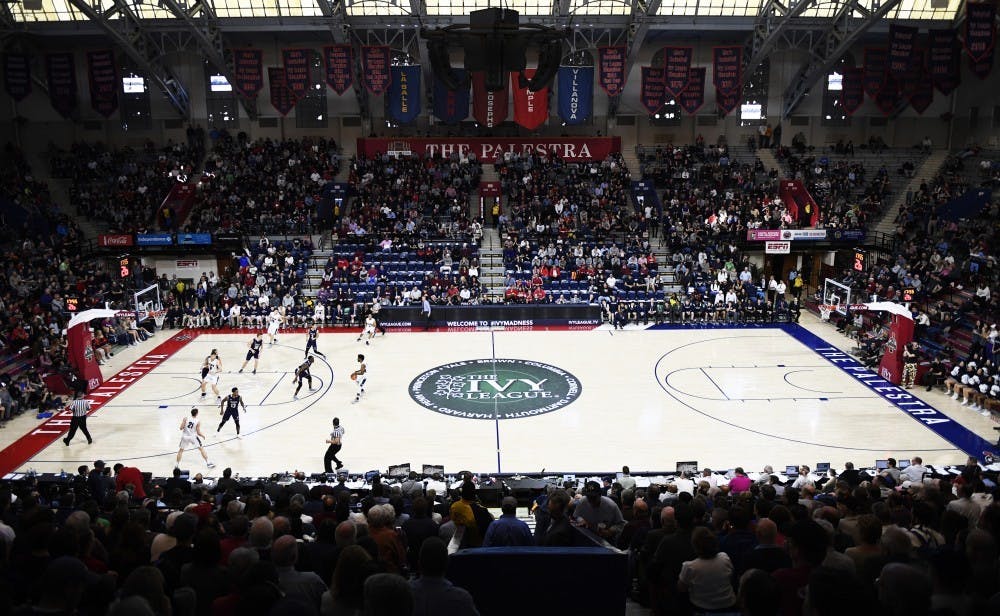
Because of Penn men's basketball's status an Ivy League school, it remains unclear what, if any, recruiting sanctions the program could see following Jerome Allen's bribery allegations.
Credit: Chase SuttonWeeks after news broke that former Penn men’s basketball coach Jerome Allen allegedly accepted bribes from Philip Esformes, the father of former Penn men's basketball recruit Morris Esformes, Penn Athletics' investigation of the matter is well underway.
But what can be expected for the school's athletic program moving forward?
It's hard to say given the unprecedented nature of this case.
Christian Dennie, an attorney for Barlow Garsek & Simon, LLP. has eight years of experience representing student-athletes, coaches, and institutions in NCAA investigations and compliance, but even he could not find a similar case in which a recruit’s family had allegedly paid the program’s coach. The more common NCAA violation is a school, coach, or company paying a player.
“I can’t recall another case where this would happen,” Dennie said. “I mean it’s an Ivy League school, and Ivy League schools are hard to get into and everything in between. So it’s a little bit [of a] different ballgame there.”
Despite retaining outside counsel, Penn will continue to play a big role in the upcoming investigation.
“[The school’s role] varies based on the case, but usually the school is pretty heavily involved,” Dennie said. “There will be interviews and campus visits from the NCAA if it gets deep into it. Obviously that’ll be on the campus, so you’ll have campus administrators involved, and of course legal counsel is always gonna be in close contact with the client.”
As Dennie previously alluded to, the NCAA will likely monitor the situation to determine if Penn’s outside legal counsel is operating within NCAA bylaws. If so, the NCAA may choose to accept any self-imposed sanctions instead of recommending their own after a separate investigation.
One important factor on which the NCAA will likely place its focus is whether or not Allen included these benefits as part of his income.
“There are some concerns, specifically being that all coaches are required to report outside income on a form every year,” Dennie said. “If that wasn’t reported, that would potentially be an issue ... and if this was a form of compensation, the legislation requires that the compensation comes through the university.”
Problems could also arise regarding the time frame and setting in which Allen had contact with the Esformes family. NCAA rules dictate recruiting “dead periods” during which no contact can be made between the program and a potential recruit. If Allen met with the Esformes family during one of these periods, Penn men's basketball could have committed an NCAA recruiting violation. According to the Esformes’ lawyer, Howard Srebnick, Allen acted as Esformes’ private coach throughout most of his time in high school.
Asked if the University would allow a coach to receive payments for individual basketball coaching, as Esformes' lawyer said was the case, Penn Director of Athletic Communications Mike Mahoney told Inside Higher Ed, "I believe NCAA rules would not allow a coach to provide individual training to a recruitable athlete."
According to Dennie, should the investigation conclude that NCAA rules were broken, they are likely be considered a Level III NCAA violation, characterized as a breach of conduct. According to the NCAA website, Level III infractions are those “that are isolated or limited in nature; provide no more than a minimal recruiting, competitive, or other advantage; and do not include more than a minimal impermissible benefit.”
As a result, Penn could receive a couple of different types of sanctions, according to Dennie.
“In a situation like this where [the violation] is recruiting-based, there’s usually gonna be some kind of recruiting restriction placed on the team, being that it can’t recruit during certain time periods and gets less opportunities to recruit,” Dennie said. “And there may be other types of restrictions on practices and things like that that may come up.”
One of the typical NCAA sanctions for recruiting violations is a reduction in the amount of scholarships awarded to student-athletes. In another unique wrinkle to the case, Penn does not offer athletic scholarships to begin with, in compliance with Ivy League rules.
As for the timetable, there is no way of knowing how long the investigation will take, but it could feasibly take several months or even a year for this case to ultimately be resolved.
While many of the important details unique to this case make it unprecedented in the broader NCAA landscape, the ongoing investigation should still follow some established patterns. Any punishment aimed at the men’s basketball program will likely be either self-imposed, recommended by the NCAA or both, and come in the form of restrictions on recruiting.
It also remains a possibility that the investigation will find no NCAA violations.
The Daily Pennsylvanian is an independent, student-run newspaper. Please consider making a donation to support the coverage that shapes the University. Your generosity ensures a future of strong journalism at Penn.
Donate




